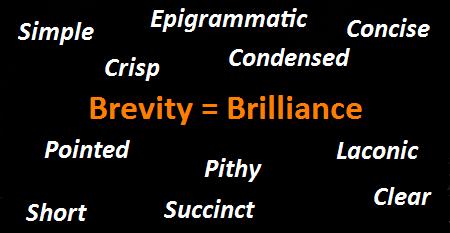Do you ever grow weary of listening to the verbose, or reading the work of those that have issues with clear articulation? I certainly do…but fear not; the lost art of brevity is making a comeback. Those of you that know me have come to understand that I prefer to cut to the chase. I like to get to the root of an issue as quickly as possible. While I appreciate the great oratory skills of those who communicate using wonderful word pictures or the academics who can wax eloquent while always using the best form of prose, I prefer my business communication to be quick and dirty. In the immortal words of Jack Webb: “The facts ma’am…just the facts.” In today’s post, I’ll look at the benefits associated with the resurgence of brevity.
Let me begin clearly by stating that it is not my goal to be perceived as a word-basher. I appreciate anyone who has command of a great vocabulary, but I don’t have time for a 30-minute explanation of something that could have been and should have been, communicated in 2 minutes.
Brevity is rare because it takes both skill and effort to simplify the complex. It’s easier to remain ethereal, vague, and ambiguous than it is to communicate with purpose and clarity. My message today is a simple one – refining your communications skill is well worth the effort. Don’t be the person known for rambling on, be the person known for being articulate and to the point.
Probably the greatest example of the power of brevity comes from what is widely considered to be the greatest speech in American history: “The Gettysburg Address.” President Lincoln’s speech was only 10 sentences long (272 words), and lasted less than a mere 3 minutes in length. Contrast Lincoln’s brilliant example of the power of brevity with the keynote speech that day. The renowned orator Edward Everett preceded President Lincoln on the podium at Gettysburg. Everett’s speech was an amazing two hours in length. He was after all the President of Harvard, but I digress…My question is this: which speech was more effective and more memorable? Ah, the power of brevity…
The good news is that there are two big trends emboldening those of us who prefer brevity over other more irritating forms of communication. First is the time pressure for our attention. People simply don’t have the time to listen to or read, unnecessarily long forms of communication. The second trend is technology’s recognition of the first trend. Emails, voicemails, instant messages, text messages, blogs, Tweets, Facebook updates, etc., simply don’t lend themselves to the indulgence of pompous grandeur.
If you think I’m joking when I mention Twitter, think again. If you want to become a better writer and refine your sense of brevity, all you have to do is to start Tweeting. Regardless of how you feel about Twitter as a platform or practice, it is brilliant in its mandate of brevity. Twitter requires that all your communication be conducted in 140 characters (including punctuation and spaces) or less. Even given this stringent requirement, some of the most intriguing, complex, savvy, and sometimes ridiculous thoughts are being expressed at a rapidly growing pace. In 140 characters or less, elections are influenced, the news is being broken, relationships are being created and expanded, brands are being built, trust is being built, influence is being generated, and products & services are being sold. Don’t underestimate the power of brevity.
One of my favorite lines from Shakespeare’s Hamlet is “Brevity is the soul of wit,” and if you examine those people in your life you respect the most I’m certain you’ll find they do justice to Shakespeare’s ideal. If you require one last example of the power of brevity, let me ask you to examine the incredible influence that something as brief as a simple quote can have. Think about how often a sentence or two written down in the form of a quote has created a legacy long surpassing many more complex and lengthy works. Most people can cite several of Mark Twain’s quotes, but only a few of his books.
So, how do you know if you’re guilty of contributing to the destruction of brevity? If you exhibit any of the tell-tale signs below you may want to seek out some help:
- If your tag-line is more than 4 words in length;
- If the most frequently used words in your vocabulary are “and,” “um” & “but;”
- If people are consistently dozing off during your keynote;
- If the bailout rate on your webcasts are high;
- If the use of the scroll bar is a requirement for reading your email;
- If you run out of time leaving a voicemail message…
- If you kill your cell phone battery with one conversation…
- If your PowerPoint slides need to be read instead of viewed;
- If your URL is so long that it confuses people, and;
- If you need a teleprompter to deliver a speech.
Bottom line…I’m in awe of those who have mastered the art of brevity, and after looking back at this post I must admit that I still have some work to do…







